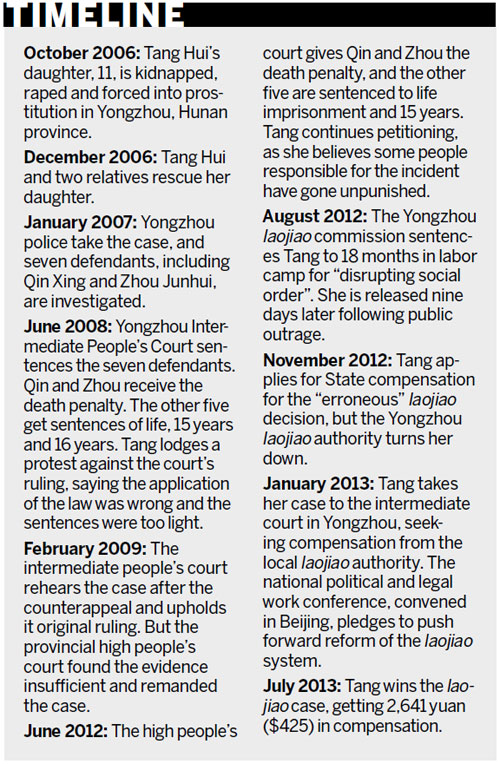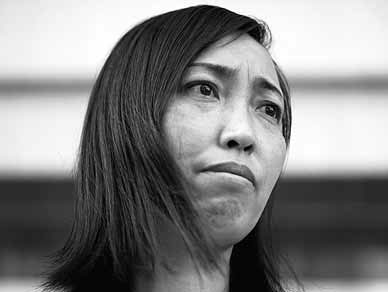Death penalties reversed in forced-prostitution case
By Cao Yin (China Daily) Updated: 2014-06-13 07:24China's top court ruled against giving the death penalty on Thursday to two men convicted of forcing a girl into prostitution, a move hailed by law experts and judges.
In defense of their ruling, the Supreme People's Court said the alleged actions by Qin Xing and Zhou Junhui to force a then 11-year-old girl into prostitution in Yongzhou, Hunan province, did not constitute "the most serious" crime under the current Chinese Criminal Law.
Qin and Zhou are currently in detention on charges of kidnapping, raping and forcing the girl, identified under the alias Le Le, to engage in prostitution more than 100 times from October until December 2006.
The Supreme Court did not address the other charges in the ruling. In a statement, the top court said the death penalty was unreasonable because there is possible new evidence in the case from Qin.
The case has been remanded to the Hunan High People's Court for retrial, and the top court said the new evidence will factor into the retrial.
The decision to refrain from using the death penalty quickly stirred controversy after the top court published the ruling on its micro blog. Netizens questioned what crimes could be labeled "the most serious".
The top court said the most serious crimes according to the law are those in which a person who is primarily responsible for a criminal offense forces several girls into prostitution, forces them into prostitution in public multiple times after detaining and kidnapping them, or whose coercion is so brutal it handicaps or kills the victims.
A Beijing judge surnamed Wu agreed with the court's decision and said the seriousness of a crime is viewed differently by the public. "Verdicts of each court cannot be affected by public opinion. We must respect the law," said Wu, who declined to give his full name.
Wu said that according to the criminal law, people who force others into prostitution often face sentences of five to 10 years. He also said Qin and Zhou will not face the death penalty after the retrial because of the top court's ruling.
Cheng Lei, an associate law professor at Renmin University of China, said the top court's ruling reflects its prudence in dealing with the death penalty.
"It's necessary to strictly control the death penalty in our country, and I'm glad to see the top court enforces it well," Cheng said. "It also shows our law's principle of tempering justice with mercy."
The case drew public attention after Tang Hui, Le Le's mother, wrote a blog post in 2010 that seven defendants, including Qin and Zhou, kidnapped, raped and forced her daughter into prostitution, causing the girl physical harm and mental anguish.
"The damage to my child caused by Qin and Zhou was more than killing a man. Their punishment should be much more severe," Tang said after the top court's ruling.
"My life's focus returned to my business and family last year, but now I have to start a new petition for the case."
Tang was sentenced to 18 months of re-education through labor for her repeated petitions in 2012. She was released after nine days because of public outrage over the sentence. She then sued the Yongzhou laojiao commission and in 2013, received 1,641 yuan ($267) in compensation for the commission's "inappropriate" decision to put her in a labor camp. She was also awarded 1,000 yuan in compensation her for "mental injury".
Wang Zhixiang, a criminal law professor at Beijing Normal University, said sentencing a person to death depends on the law, not on a victim's petitions.
"Tang's love for her daughter can be understood, but if a verdict is affected by petitioning, the law's credibility and seriousness will be nothing," he said.
Feng Zhiwei in Changsha contributed to this story.
caoyin@chinadaily.com.cn
|
The case of Tang Hui, who was put into the now-defunct "re-education through labor" system for petitioning for harsher sentences for two men who raped her daughter, helped bring about the abolishment of the system late last year. Feng Yuanzhi / for China Daily |

(China Daily 06/13/2014 page4)
- More female officials caught in corruption
- Whampoa veterans recorded with glory
- Police bust 9 terrorist groups in Xinjiang
- Knife-wielding attackers seized in Xinjiang
- New regulation leads to drop in petitioned cases
- Hunan plant shut as probe into lead poisoning begins
- Police boost efforts to combat gambling
- Project offers jobs openings to legal experts
- Experts: Dog meat festival 'illegal'
- Nation looks to upgrade
pipeline networks







